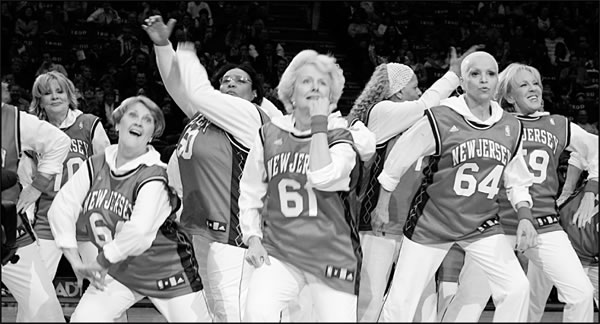By Michael Rymer
Sports documentaries hold court at Tribeca
Most independent filmmakers know how it feels to compete against established filmmakers with more experience and better funding. It’s not surprising, then, that when making films about sports, they’re often attracted to stories of overmatched and under-funded athletes. This year’s second annual Tribeca/ESPN Sports Film Festival includes four documentaries centering around unlikely sports heroes.
Few athletes have a greater claim on underdog status than the subjects of Susan Koch’s “Kicking It.” Seven men hailing from Ireland, Kenya, Spain, Afghanistan, Russia, and North Carolina travel to Cape Town, South Africa to compete in the 2006 Homeless World Cup, a soccer tournament for homeless players. The film examines the men’s homelessness, the causes of which range from drug addiction—particularly common among the players from Dublin—to the ravages of war; most of the Afghani players are refugees.
Many players credit the their teammates’ support and the discipline of their training with helping them kick drugs or find work. “We were struck by how proud the players were to be wearing the colors of their countries,” said Koch, who learned of the event from a blog connected to the 2006 World Economic Forum in Davos. “We know the players are homeless, but they begin to transform themselves and we as viewers begin to see them in a different light,” she said.
In “Gotta Dance,” director Dori Berinstein also tracks a demographic often relegated to the margins as they embrace a sport. Her film follows the 12 women and one man who became members of the first ever senior citizen hip hop dance team for the New Jersey Nets. The Nets’ advertisement for the initial tryouts, which drew 1,000 seniors, did not mention the style of dance the troupe would perform. Berinstein captures the members as they grouse about their preference for other dance styles, including the mambo and swing, and their wariness of thumping hip hop beats.
The troupe’s instructors are two members of the mainstay Nets’ dance team, both of whom are young enough to be the granddaughters of any of the members of the senior squad (in fact, both women are the granddaughters of a member of the senior team.) The young teachers were not afraid of pushing the senior team members to their physical limits.“They recognized that they had to be really careful, because they were dealing with seniors,” said Berinstein. “But they had a standard to maintain, and they weren’t going to compromise.”
Each year, the United States’ three most prestigious marathons, in Chicago, Boston, and New York, draw hundreds of thousands of spectators to those cities’ streets—and even more television viewers. Just 40 years ago, however, the marathon was an event for a very few hardcore, often eccentric, runners that went largely unnoticed by crowds. Judd Ehrlich’s “Run for Your Life” is the story of how Fred Lebow, a Transylvanian immigrant and garment-industry businessman, almost single-handedly made the marathon an event for the many.
Lebow, who died in 1994, injected chutzpah into distance running with events such as the Crazy Legs Mini-Marathon, the first ever race in Central Park exclusively for women, which he promoted by hiring Playboy Bunnies to run. He was not a gifted runner himself; in the film, a friend compares his stride to a duck’s. According to Ehrlich, his lack of natural talent contributed to his success in selling the masses on the grueling proposition of running 26.2 miles. “Fred understood that the marathon is not so much about a road race as it is about giving everybody the opportunity to face a challenge and accomplish a goal, and he got that because of who he was,” he said.
Bobby Valentine, former manager of the New York Mets, “loves being a trailblazer,” according to Andrew Muscato, the producer of “The Zen of Bobby V.,” directed by Andrew Jenks and Jonah Quickmire Pettigrew. After the Mets fired him in 2002, Valentine passed up three offers to manage other major-league teams to take a post as the manager of the Chiba Lotte Marines, a franchise that, when he arrived in 2003, was widely considered to be the worst in the league. Less than two years later, Valentine became the first foreign manager to lead a Japanese team to win the Japan series. The film, which records the Marines’ 2007 season, captures Valentine’s enthusiasm for his home country—he’s shown skiing in Sapporo and climbing Mt. Fuji in the dark—as well as his celebrity. He’s mobbed by middle-aged women aiming their cell phone cameras and a group of young children wearing yellow hats. He also hatches a plan to create a minor-league system in Japan and dreams of a true world series in which teams from the United States would compete with teams from Japan.
The three filmmakers, NYU students who were all 21 when they embarked on the project, attribute Valentine’s love of a fight against the odds with helping them gain the access they required to make the film, which required them to lobby the Marines’ front office for unprecedented clubhouse access.
“It was the idea of three college kids trying to make a movie that sparked his interest more than anything,” said Jenks. “Bobby is a fan of the underdog.”



































